Chapter 3 British Parliament 英美文化概论 教学课件
- 格式:ppt
- 大小:1.14 MB
- 文档页数:31
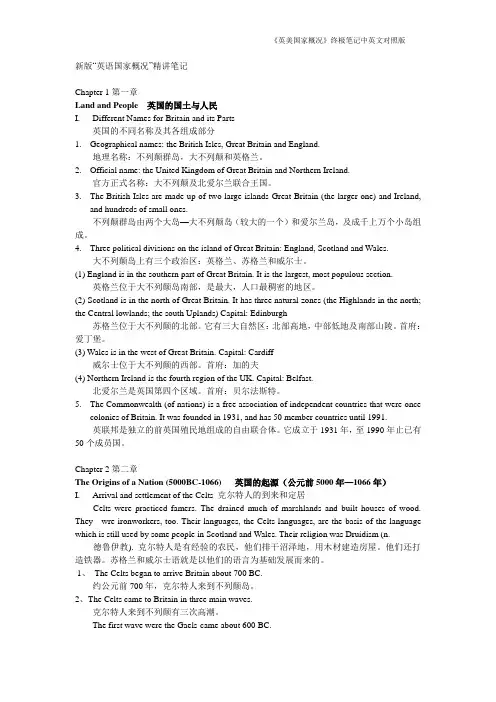
新版“英语国家概况”精讲笔记Chapter 1第一章Land and People 英国的国土与人民I.Different Names for Britain and its Parts英国的不同名称及其各组成部分1.Geographical names: the British Isles, Great Britain and England.地理名称:不列颠群岛,大不列颠和英格兰。
2.Official name: the United Kingdom of Great Britain and Northern Ireland.官方正式名称:大不列颠及北爱尔兰联合王国。
3.The British Isles are made up of two large islands-Great Britain (the larger one) and Ireland,and hundreds of small ones.不列颠群岛由两个大岛—大不列颠岛(较大的一个)和爱尔兰岛,及成千上万个小岛组成。
4.Three political divisions on the island of Great Britain: England, Scotland and Wales.大不列颠岛上有三个政治区:英格兰、苏格兰和威尔士。
(1) England is in the southern part of Great Britain. It is the largest, most populous section.英格兰位于大不列颠岛南部,是最大,人口最稠密的地区。
(2) Scotland is in the north of Great Britain. It has three natural zones (the Highlands in the north; the Central lowlands; the south Uplands) Capital: Edinburgh苏格兰位于大不列颠的北部。
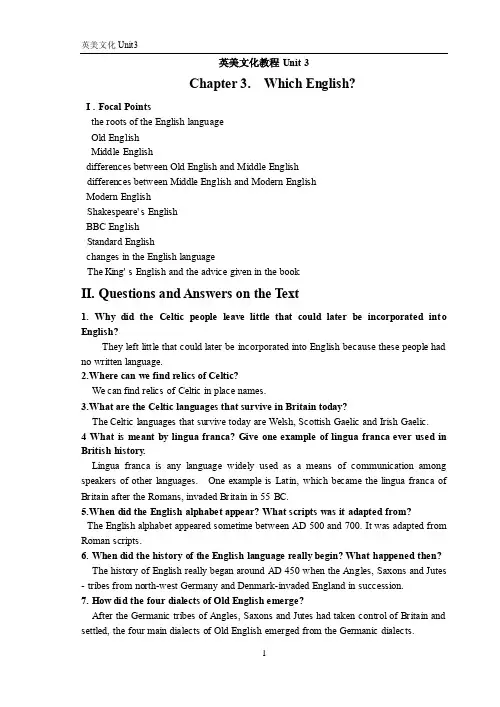
英美文化教程Unit 3Chapter 3. Which English?I . Focal Pointsthe roots of the English languageOld EnglishMiddle Englishdifferences between Old English and Middle Englishdifferences between Middle English and Modern EnglishModern EnglishShakespeare' s EnglishBBC EnglishStandard Englishchanges in the English languageThe King' s English and the advice given in the bookII. Questions and Answers on the T ext1. Why did the Celtic people leave little that could later be incorporated into English?They left little that could later be incorporated into English because these people had no written language.2.Where can we find relics of Celtic?We can find relics of Celtic in place names.3.What are the Celtic languages that survive in Britain today?The Celtic languages that survive today are Welsh, Scottish Gaelic and Irish Gaelic.4 What is meant by lingua franca? Give one example of lingua franca ever used in British history.Lingua franca is any language widely used as a means of communication among speakers of other languages. One example is Latin, which became the lingua franca of Britain after the Romans, invaded Britain in 55 BC.5.When did the English alphabet appear? What scripts was it adapted from?The English alphabet appeared sometime between AD 500 and 700. It was adapted from Roman scripts.6. When did the history of the English language really begin? What happened then? The history of English really began around AD 450 when the Angles, Saxons and Jutes - tribes from north-west Germany and Denmark-invaded England in succession.7. How did the four dialects of Old English emerge?After the Germanic tribes of Angles, Saxons and Jutes had taken control of Britain and settled, the four main dialects of Old English emerged from the Germanic dialects.8. What is the ancestor of the modern English language?The ancestor of the modern English language is Old English of Anglo-Saxon.9. What scripts did writers of the Old English period use?Writers of the Old English period used both Latin and Germanic scripts.10. How did the Scandinavian influence enter Old English?The Scandinavian influence entered Old English by way of the Vikings from Scandinavia.11. How large was the vocabulary of Old English by the end of its period?By the end of its period, Old English contained a vocabulary of 30,000 words.12. Name one best-known Old English writer and his works.One of the best-known Old English writers was the V enerable Bede (673--735). His Ecclesiastical History of the English People is one of the main sources of information about the history of Anglo-Saxon English.13. What became the official language of England after the Norman invasion led by William the Conqueror? What language did the common people speak?After the Norman invasion led by William the Conqueror, Norman French became the official language of England. The common people, however, continued to speak their Anglo-Saxon language.14. In English, why do many words connected with administration come from Norman French?Many English words connected with administration come from French because after the Norman invasion Norman French became the official language of England, and the most important positions were given to Normans, who organized government and public affairs.15. What is known as Middle English?The blend of Anglo-Saxon, Latin and French which developed in the three centuries after the Norman Conquest is known as Middle English.16. When did Middle English begin?Middle English began in 1066.17. Why did the literature of England become trilingual in the three centuries following 1066?The literature of England became trilingual because the literature was written in Middle English, which is a blend of French, English and Latin.18. In Middle English, what is meant by the Romance words, and what is meant by the Germanic words?Romance words were the Latin and French words; Germanic words were the English and Scandinavian words.19. Who was the most important writer who used Middle English?The most important writer who used Middle English was Geoffrey Chaucer.20. What is the basic difference between Old English and Middle English?The difference between Old English and Middle English lies mainly in the abandonment of the system of grammatical inflexions.21. In what aspects did the changes from Middle English to Modern English take place?The changes from Middle English to Modern English involve mainly pronunciation, vocabulary and spelling.22. When did the spellings and written forms of English begin to become standardized?The spellings and written forms of English began to become standardized at the end of the fifteenth century, with the invention of the printing press (1476).23. When did Modern English start?Modern English started from about AD 1500.24. What does BBC stand for? When was it founded? What was its motto?BBC stands for the British Broadcasting Corporation. It was founded in 1927. Its motto was Nation Shall Speak Peace Unto Nation. It meant that the English in which the voice of peace was broadcast over the radio should be universally understood.25. Whose particular style of speech is usually recognized as Standard English or Received Pronunciation English?The Particular style of speech of the BBC announcers is usually recognized as Standard English or RP English.26. Whom do the speech patterns of the BBC announcers represent?The speech patterns of the BBC announcers represent the educated southern upper class.27. Why has the English language had a very strong association with class and social status?This began from the Norman times when the upper classes spoke a completely different language from the common people.28. What difference have modern ideas of social equality made to language use in Britain?With the ideas of social equality, hallmarks of class distinction such as styles of speech have been gradually discarded, especially by the younger generation.29. What was the attitude towards language use in Britain by the second half of the 1960s? What was the characteristic of the fashionable speech of the day?By the second half of the 1960s, it became apparent that it was not necessary to speak Standard English or even correct grammar to become popular, successful and rich. The fashionable speech of the day was no longer the prerogative of a privileged class rather a defiant expression of classlessness.30. What is the greatest single influence of the shaping of the English language in modern times?The greatest single influence of the shaping of the English language in modern times is the American accents, idioms and vocabulary exported all over the globe by US films.31. What was the characteristic of the fashion of speech in the 1970’s in Britain?In the 1970s, fashion favoured careless enunciation and a language full of jargon, slang and "in" words, much of it quite incomprehensible to the outside world.32. Who were the authors of The King' s English?The authors of The King' s English were the Fowler brothers.33. What is the approximate proportion of Germanic vocabulary and Romance vocabulary in current English vocabulary?Current English V ocabulary is approximately half Germanic (English and Scandinavian) and half Romance (Latin and French).IV. Explanations:1. Old English(1) Also called Anglo-Saxon, it is the first period of the English language from the time of the Anglo-Saxon invasion of Britain in AD450 to the Norman Conquest in 1066.(2) Old English used both Latin and Germanic scripts. (3) Old English is the ancestor of Modern English. It is quite different from today's English.2. the V enerable Bede(1) The V enerable Bede (673--735) was one of the best. known Old English scholar-monks. (2) He wrote the Ecclesiastical History of the English People, which is one of the main sources of information about the history of Anglo-Saxon England.3. Middle English(1) Middle English is the name given to the English language in use from the Norman Conquest of 1066 to the introduction of the printing press in England in 1476. (2) Middle English is the blend of Anglo-Saxon, Latin and French. (3) The difference between Old English and Middle English lies mainly in the abandonment of the system of grammatical inflexions.4. Geoffrey Chaucer(1) Geoffrey Chaucer (1345--1400) was the most important Middle English poet. (2) His masterpiece was The Canterbury Tales.5. Modern English(1) Modern English is the English language since 1476. (2) With the introduction of the printing press in 1476, spellings and written forms of the English language began to become standardized. (3) The changes from Middle English to Modern English involve mainly pronunciation, vocabulary and spelling.6. the BBC(1) It stands for the British Broadcasting Corporation. (2) Its motto is Nation Shall Speak Peace Unto Nation. (3) The motto means that the voice of peace spoken over the radio should be universally understood. (4) The speech patterns of BBC annoumers represent the educated southern upper class, and their particular style of speech is recognized as Standard English or Received Pronunciation (RP) English.7. Standard English(1) The form of English as written and spoken by educated speakers of the language. (2) The style of speech of BBC announcers is usually recognized as Standard English. (3) Standard English is also the most appropriate variety of English for a foreigner learning English to copy.8. The King' s English(1) The famous book written by the Fowler brothers in 1906. (2) The best advice to all those who wish to become proficient in English was given in this book. (3) The best advice is to try to be direct, simple, brief, vigorous and lucid. (4)This general principle may be translated into practical rules in the domain of vocabulary as follows: Prefer the familiar words to the far-fetched.Prefer the concrete word to the abstract.Prefer the single word to the circumlocation.Prefer the short word to the long.Prefer the Saxon word to the Romance.。

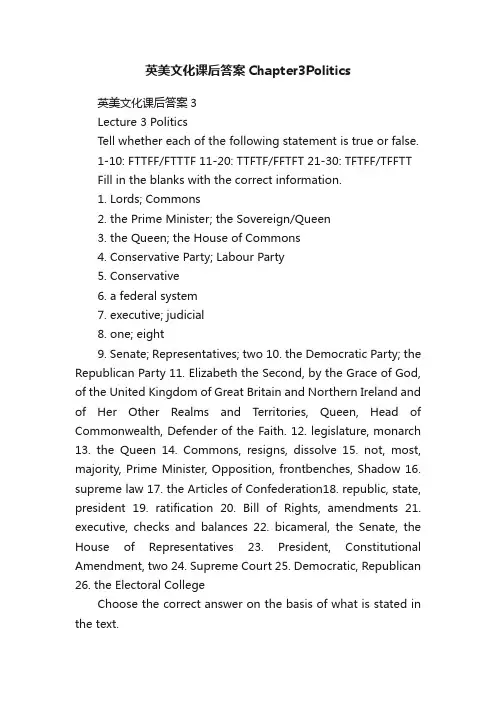
英美文化课后答案Chapter3Politics英美文化课后答案3Lecture 3 PoliticsTell whether each of the following statement is true or false.1-10: FTTFF/FTTTF 11-20: TTFTF/FFTFT 21-30: TFTFF/TFFTT Fill in the blanks with the correct information.1. Lords; Commons2. the Prime Minister; the Sovereign/Queen3. the Queen; the House of Commons4. Conservative Party; Labour Party5. Conservative6. a federal system7. executive; judicial8. one; eight9. Senate; Representatives; two 10. the Democratic Party; the Republican Party 11. Elizabeth the Second, by the Grace of God, of the United Kingdom of Great Britain and Northern Ireland and of Her Other Realms and Territories, Queen, Head of Commonwealth, Defender of the Faith. 12. legislature, monarch 13. the Queen 14. Commons, resigns, dissolve 15. not, most, majority, Prime Minister, Opposition, frontbenches, Shadow 16. supreme law 17. the Articles of Confederation18. republic, state, president 19. ratification 20. Bill of Rights, amendments 21. executive, checks and balances 22. bicameral, the Senate, the House of Representatives 23. President, Constitutional Amendment, two 24. Supreme Court 25. Democratic, Republican 26. the Electoral CollegeChoose the correct answer on the basis of what is stated in the text.1-10: CDAAC/ADDAD 11-20: DCDBC/ADDAC 21-28: BCDAB/BDBExplain the following terms.1. British ParliamentThe British Parliament today consists of three parts: the Queen, the House of Lords and the House of Commons. The Parliament has a number of different functions. First and foremost, it passes laws. Another role of the Parliament is to scrutinize, or examine the government.2. Life peerLife peers receive their noble titles from the Queen on the advice of the Prime Minister. However, a life peer cannot pass the title on to his or her children. These appointments are usually made for people’s outstanding careers or contributions to society. Famous people who have been made peers are former British Prime Ministers Winston Churchill and Margaret Thatcher.3. British ConstitutionThe U.K. does not have a written constitution, which most countries have. While much of the constitution is written down, it is not systematically written into a single document. The British Constitution is made up of three main parts: Statutes, Common Laws and Conventions.4. The Labour PartyThe Labour Party was developed by the growing trade union movement at the end of the 19th century. It quickly replaced the Liberal Party as one of the two largest political parties in the U.K. The Labour Party supported state control of important industries and a more equal distribution of wealth. It has drawn financial support from the trade unions.5. The U.S. ConstitutionThe Constitution of the United States was written as a single political document in 1787. There were only 7 articles in it. The Constitution demands the election of the president, and provides that federal laws would only be made by a Congress. It also provides for a national court system headed by a Supreme Court. The Constitution follows these principles: federal system, “checks and balances” of the powers and respect for the Constitution.6. A federal systemA federal system is one in which power is shared between the central government and the state government. Therefore, each of the Americans is under the two governments--the federal government and the state government. The federal government has the right to declare war, to tax, to borrow or coin money and to regulate business and trade. Generally speaking, the federal government deals with foreign affairs and matters of general concern to all the states.7. Checks and balancesWhen Americans talk about the system of “checks and balances”, they often refer to the three-part government. The system limits the powers of the three branches. Each branch has powers that the others do not have, and each branch is given power to check the operations of the others, so that no one branch can become too powerful.8. The CongressThe Congress is the supreme legislative branch of the U.S. government. Under the Constitution, it is the only branch that can make federal laws, levy federal taxes, and declare war upon other countries. The American Congress is made up of two houses: the Senate and the House of Representatives. BothSenators and Representatives of the House are chosen by a direct election from all of the states.9. Bill of RightsMany of the recommendations of the states ratifying conventions were considered later by James Madison as he drafted what became the Bill of The Rights. It is commonly viewed as consisting of the first 10 articles of Amendments to the Constitution. These amendments give all Americans rights to believe in any religion; to speak, write and publish as they like; to gather together peaceably and to petition the government; to be secure in their homes without fear of unreasonable searches and seizure of persons and property; and to receive fair and just treatment in courts of law. The Bill of Rights was added in 1791.10. jurisdictionJurisdiction is the authority to hear and decide cases. According to the Constitution, the federal courts exercise jurisdiction over cases in which the subject involves either the U.S. Constitution, statutes, or treaties; maritime law; or cases in which the litigants include either the U.S. government, more than one state government, one state government and a citizen of another state, citizens of more than one state, or a foreign government or citizen. The state courts exercise jurisdiction over the remaining cases. These include most criminal cases.11. Electoral CollegeIt is a body that elects the president and vice president. Each state is represented by the same number of members as in its congressional delegation. In another word, each has as many electors as the total representation in Congress (House plus Senate). The voters vote for electors who will cast their ballots in the Electoral College. Because of the winner-take-all feature ofthe Electoral College, the system gives an advantage to large states and their urban populations.12. Manifest DestinyThe 19th century journalist John O’Sullivan coined the phrase “manifest destiny”in an 1839 article. It conveyed the belief in the divinely conferred right of the republic to expand westward and bring more of the continent into “the great experiment of Liberty and Federated self-government”.Questions for Discussion1.The Articles of Confederation was the first governing Constitution of the United States ofAmerica. Although serving a crucial role in the victory in the American Revolutionary War, a group of reformers felt that the Articles lacked the necessary provisions for a sufficiently effective government. Another problem is that the government lacked taxing authority; it had to request funds from the states. Another criticism of the Articles was that they did not strike the right balance between large and small states in the legislative decision making process. 2.Legislature is a type of representative assembly with the power to create and change laws.The President has the authority to appoint federal judges as vacancies occur. Under the Constitution, the President is responsible for foreign relations with other nations. He also has the right to veto or sign any bills passed by Congress. He can call into service of the National Guard. The judicial branch is headed by the Supreme Court, which is the only court specifically created by the Constitution. The Supreme Court is the ultimate appellate court in the United States. It usually hears cases on appeal. If Congress proposes a law that the President thinks is unwise, the President can veto it. That means the proposal does not becomelaw. If Congress passes a law which is then challenged in the courts as unconstitutional, the Supreme Court has the power to declare the law unconstitutional and therefore no longer in effect.。
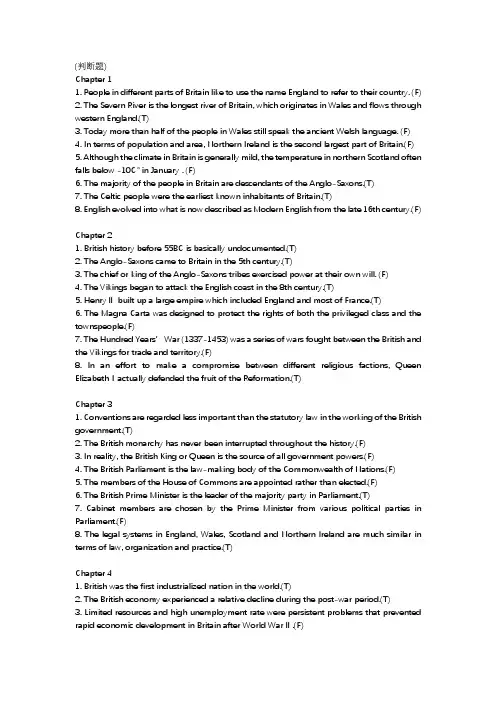
(判断题)Chapter 11. People in different parts of Britain like to use the name England to refer to their country. (F)2. The Severn River is the longest river of Britain, which originates in Wales and flows through western England.(T)3. Today more than half of the people in Wales still speak the ancient Welsh language. (F)4. In terms of population and area, Northern Ireland is the second largest part of Britain.(F)5. Although the climate in Britain is generally mild, the temperature in northern Scotland often falls below -10℃ in January . (F)6. The majority of the people in Britain are descendants of the Anglo-Saxons.(T)7. The Celtic people were the earliest known inhabitants of Britain.(T)8. English evolved into what is now described as Modern English from the late 16th century.(F)Chapter 21. British history before 55BC is basically undocumented.(T)2. The Anglo-Saxons came to Britain in the 5th century.(T)3. The chief or king of the Anglo-Saxons tribes exercised power at their own will. (F)4. The Vikings began to attack the English coast in the 8th century.(T)5. HenryⅡ built up a large empire which included England and most of France.(T)6. The Magna Carta was designed to protect the rights of both the privileged class and the townspeople.(F)7. The Hundred Years’War (1337-1453) was a series of wars fought between the British and the Vikings for trade and territory.(F)8. In an effort to make a compromise between different religious factions, Queen ElizabethⅠactually defended the fruit of the Reformation.(T)Chapter 31. Conventions are regarded less important than the statutory law in the working of the British government.(T)2. The British monarchy has never been interrupted throughout the history.(F)3. In reality, the British King or Queen is the source of all government powers.(F)4. The British Parliament is the law-making body of the Commonwealth of Nations.(F)5. The members of the House of Commons are appointed rather than elected.(F)6. The British Prime Minister is the leader of the majority party in Parliament.(T)7. Cabinet members are chosen by the Prime Minister from various political parties in Parliament.(F)8. The legal systems in England, Wales, Scotland and Northern Ireland are much similar in terms of law, organization and practice.(T)Chapter 41. British was the first industrialized nation in the world.(T)2. The British economy experienced a relative decline during the post-war period.(T)3. Limited resources and high unemployment rate were persistent problems that prevented rapid economic development in Britain after World WarⅡ.(F)4. Thatcher’s revolution turned out to be a great success i n dealing with all the British economic and social problems.(F)5. The economic approach adopted by Tony Blair was different from that of the old Labor Party and the Conservative Party.(T)6. Blair made the Bank of England independent in order to separate politics from economic policy.(T)7. Britain is an important oil exporter since its oil industry has a long history.(F)8. Nuclear power is one of the major energy source in Britain.(T)Chapter 51. The British government has been responsible for education since the early1800s.(F)2. Education in Britain is compulsory for all children between the ages of 6 and15.(F)3. The National Curriculum is compulsory in both the state system and theindependent system.(F)4. When children finish their schooling at 16, they are required to take a nationalGCSE examination.(T)5. Graduates from state schools in Britain have a less favorable chance to enterfamous universities than those from independent schools.(T)6. The Times is the world’s oldest Sunday newspapers.(F)7. The BBC World Service broadcasts only in English throughout the world.(F)(选择题)Chapter 11. The two main islands of the British Isles are .A. Great Britain and IrelandB. Great Britain and ScotlandC. Great Britain and WalesD. Great Britain and England2. is the capital city of Scotland.A. BelfastB. EdinburghC. AberdeenD. Cardiff3. Among the four parts of the United Kingdom, is the smallest.A. EnglandB. ScotlandC. WalesD. NorthernIreland4. English belongs to the group of Indo-European family of languages.A. CelticB. Indo-IranianC. GermanicD. Roman5. The introduction of Christianity to Britain added the first element ofwords to English.A. Danish and FinnishB. Dutch and GermanC. French and ItalianD. Latin and Greek6. The evolution of Middle English was reinforced by the influence.A. NormanB. DutchC. GermanD. Danish7. Samuel Johnson’s dictionary was influential in establishing a standard form of .A. grammarB. handwritingC. spellingD.pronunciation8. At present, nearly of the world’s population communicate in English.A. halfB. a quarterC. one thirdD. one fifthChapter 21. The attack on Rome ended the Roman occupation in Britain in 410.A. NormanB. DanishC. CelticD. Germanic2. By the late 7th century, became the dominant religion in England.A. Celtic ChristianityB. Anglo-Saxon ChristianityC. Germanic ChristianityD. Roman Christianity3. The marked the establishment of feudalism in England.A. Viking invasionB. signing of the Magna CartaC. Norman ConquestD. Adoption of common law4. The end of the Wars of the Roses led to the rule of .A. the House of ValoisB. the House of YorkC. the House of TudorD. the House of Lancaster5. The direct cause for the Religious Reformation was King Henry VIII’s effort to .A. divorce his wifeB. break with RomeC. support the ProtestantsD. declare his supreme power over the church6. The English Civil War broke out in 1642 between .A. Protestants and PuritansB. Royalists and ParliamentariansC. nobles and peasantsD. aristocrats and Christians7. was passed after the Glorious Revolution.A. Bill of RightsB. Act of SupremacyC. Provisions of OxfordD. Magna Carta8. The Industrial Revolution was accomplished in Britain by the middle of the century.A. 17thB. 18thC. 19thD. 20thChapter 31. The British government is characterized by a division of powers between three ofthe following branches with the exception of the .A. judiciaryB. legislatureC. monarchyD. executive2. The importance of the British monarchy can be seen in its effect on .A. passing the billsB. advising the governmentC. political partiesD. public attitude3. As a revising chamber, the House of Lords is expected to the House of commons.A. rivalB. complementC. criticizeD. inspect4. is at the center of the British political system.A. The CabinetB. The House of LordsC. The House of CommonsD. The Privy Council5. The main duty of the British Privy Council is to .A. make decisionsB. give adviceC. pass billsD. supervise the Cabinet6. Generally speaking, the British Parliament operates on a system.A. single-partyB. two-partyC. three-partyD. multi-party7. The policies of the Conservative Party are characterized by pragmatism and .A. government interventionB. nationalization of enterprisesC. social reformD. a belief in individualism8. In Britain, the parliamentary general election is held every years.A. threeB. fourC. fiveD. sixChapter 41. The in the early 1970s worsened an already stagnant economy inBritain.A. oil crisisB. high inflation ratesC. large importsD. unemployment problem2. Of the following practices, does not belong to Thatcher’s social welfare reform.A. reducing child benefitsB. shortening the unemployment benefits periodC. reducing the unemploymentD. lowering old age pensions3. The Blair government has been successful in all the following aspects except .A. limiting government spendingB. keeping inflation under controlC. reducing unemploymentD. reducing inequality4. Britain has devoted of its land area to agriculture.A. 54%B. 64%C. 74%D.84%5. Britain’s important fishing areas include all the following except .A. the North SeaB. the English ChannelC. The sea area around IrelandD. The sea area between Britain and Ireland6. Coal mining industry in Britain provides of the energy consumed in the country.A. 1/3B. 1/4C. 1/5D. 2/37. The car industry in Britain in mostly .A. foreign-ownedB. state-ownedC. joint-ventureD. privately-owned8. Of the following sectors in Britain, has experienced spectacular growth since the end of Word War II.A. agricultureB. energy industryC. service industryD. manufacturing industryChapter 51. In Britain, the division between grammar schools and vocational schools wereended by the introduction of comprehensive schools in the .A. 1930sB. 1940sC. 1950sD. 1960s2.Over of British children receive primary and secondary education through the independent system.A. 5%B. 6%C. 7%D. 8%3. Partially funded by central government grants, the British universities receive their remaining funds from all the following sources except .A. tuition feesB. loansC. donationsD. corporate contributions4. To be admitted to the Open University, one needA. some educational qualificationsB. no educational qualificationsC. General Certificate of Education-AdvancedD. General National Vocational Qualifications5. Among Britain’s quality press, the following newspapers are regarded as the “Big Three” with the exception of .A. The TimesB. The GuardianC. The ObserverD. The Daily Telegraph6. Life on Earth is a kind of program produced by the BBC and is popular among 500 million viewers worldwide.A. featureB. dramaC. documentaryD. soap opera7. is Britain’s top pay television provider.A. BSBB. SkyTVC. BBCD. BSkyB8. The following Christmas traditions are particularly British except .A. Trooping the ColorB. Queen’s Christmas messageC. Boxing DayD. Christmas pantomime(简答题)Chapter 11. Why do tourists from all over the world like to go to Scotland?A: because they like to enjoy the beautiful Scottishscenery, to drink the scotchwhisky and to see the Scotsmen wearing kilts and playing bagpipes.2. How many periods can the development of the English language be divided into and what are they?A:the development of English language be divided into three period :old English , middle English ,modern English .3. Why did English become more important after the Black Death?A: the laboring and merchant classes grew in economic and social important after the Black Death. So English also grew in importance compared to French .Chapter 21. What were some of Queen Victoria’s major achievements?A:the Queen Victoria’s major achievements in alm ost every aspect : she promoted further industrial revolution, the building of railways and the growing of trade and commerce. By the end of her reign , British had developed to an empire including a quarter of the global population and nearly a quarter of the world’s landmass.2. What were the two camps in Europe in world war I?A: The central powers which included Germany ,Austria-Hungary , the ottoman empire and Bulgaria and allied powers which were mainly comprised of France , the Russian empire ,and British empire , Italy and the united states.3. Why did Britain cooperate closely with the united states after world war II?A: because they were allied during the war and share the same worries about the former soviet union.Chapter 31. What the three functions of the house of commons?A: the three functionsare : to draft laws, to scrutinize, criticize and restrain the activities of the governmentpolicy.2. What kind of public image dose liberal democrats have in Britain?A:the liberal democrats is perceived as “middle” between the conservation and the labor party . it is comparatively flexible and pragmatic in its balance of the individual and the social . it emphasizes the need for a change in Britain’sconstitutional arrangements to make the government more democratic and accountable.3. Why are independent candidates unlikely to win in the general election ?A; Because even if they were elected, they would be powerless in parliament. Therefore , it is not possible for many people to vote for independent candidates.Chapter 41. What was the negative aspect of Thatcher’s reform in the early 1980s?A: its negative aspect was a rapid increase in unemployment .in 1982,the unemployment rate reached the level of the great depression years, with three million people out of work.2. What are the characteristics of Britain’s agriculture?A:britain’s agriculture is characterized by a small portion of the population engaged in agriculture activities with a high degree of mechanization. Although it employs a mere 1% of the country’s labor force , it meets around 60% of the national demands.3. What happened to Britain’s beef industry in the mid-1990s?A: Britain’s beef industry was hit badly by BSE, resulting in a ban on beef exports in 1996.Chapter 51. What used to be the major functions of grammar schools and vocational schools in Britain?The major functions of grammar schools were to train the most academically capable students and prepare them for university , whereas the major functions of vocational schools were to help less successful students to learn a trade.2. What kind of subjects do Britain comprehensive schools provide?Britain comprehensive schools provide a general education, offering both academic subjects like literature and science, and practical subjects like cooking and carpentry.3. In what ways do Britishuniversities enjoy complete academic freedom? Britishuniversities enjoy complete academic freedom because they can appoint their own staff, decide which students to admit, provide their own courses and award their own degrees.4. What role dose the media play in British leisure culture?The media play an essential role in British leisure culture since it helps to shape the public’s opinion, determine people’s moral and political orientation and consolidate or undermine the rule or a government.。
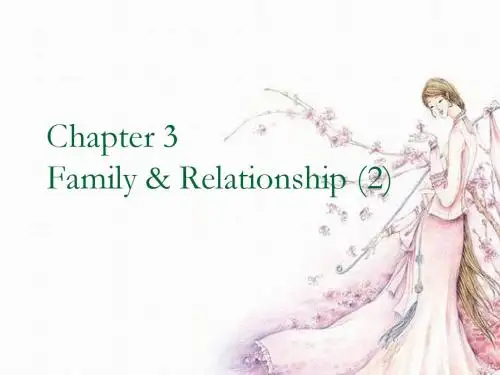
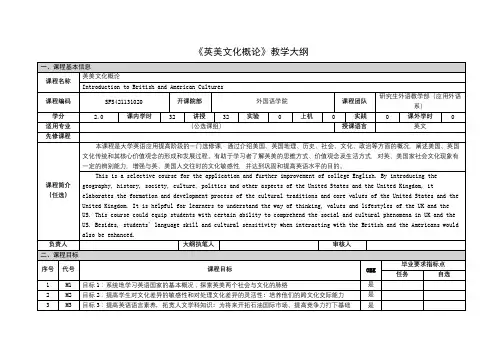
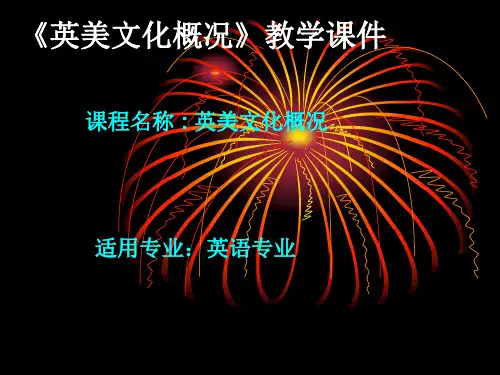
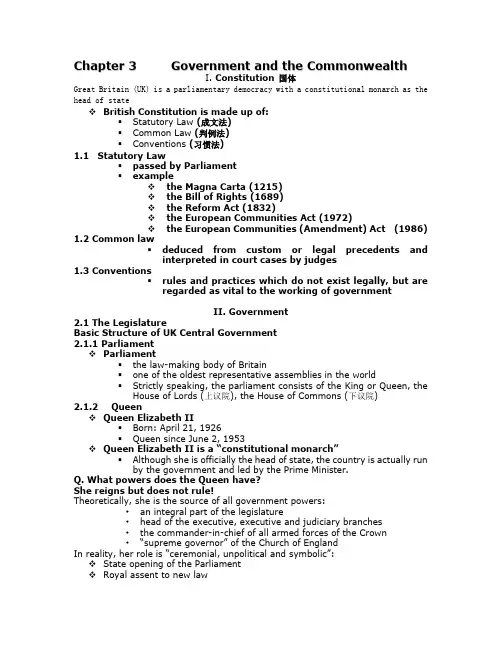
C h a p t e r3G o v e r n m e n t a n d t h e C o m m o n w e a l t hI. Constitution 国体Great Britain (UK) is a parliamentary democracy with a constitutional monarch as the head of stateBritish Constitution is made up of:▪Statutory Law (成文法)▪Common Law (判例法)▪Conventions (习惯法)1.1 Statutory Law▪passed by Parliament▪examplethe Magna Carta (1215)the Bill of Rights (1689)the Reform Act (1832)the European Communities Act (1972)the European Communities (Amendment) Act (1986) 1.2 Common law▪deduced from custom or legal precedents andinterpreted in court cases by judges1.3 Conventions▪rules and practices which do not exist legally, but areregarded as vital to the working of governmentII. Government2.1 The LegislatureBasic Structure of UK Central Government2.1.1 ParliamentParliament▪the law-making body of Britain▪one of the oldest representative assemblies in the world▪Strictly speaking, the parliament consists of the King or Queen, the House of Lords (上议院), the House of Commons (下议院)2.1.2 QueenQueen Elizabeth II▪Born: April 21, 1926▪Queen since June 2, 1953Queen Elizabeth II is a “constitutional monarch”▪Although she is officially the head of state, the country is actually run by the government and led by the Prime Minister.Q. What powers does the Queen have?She reigns but does not rule!Theoretically, she is the source of all government powers:•an integral part of the legislature•head of the executive, executive and judiciary branches•the commander-in-chief of all armed forces of the Crown•“supreme governor” of the Church of EnglandIn reality, her role is “ceremonial, unpolitical and symbolic”:State opening of the ParliamentRoyal assent to new lawMeeting with the Prime Minister at Buckingham PalacePay state visits to Commonwealth countries as head of state and non-Commonwealth countries on behalf of the British government2.1.3 The House of Lordsoften referred to as “the Upper House”The Lords Spiritual (上议院神职议员) (archbishops and prominent bishops of the Church of England)The Lords Temporal (上议院世俗议员) (hereditary peers and life peers and the Law Lords)The Upper House ReformsReduce the number of seatsfrom 705 to 666 (Mar. 1, 2004)Final court of appeal—Supreme Court2.1.4 The House of CommonsOften referred to as “the Lower House” (center of parliamentary power)Three major functions▪to pass laws, bills and acts of Parliament▪to scrutinize, criticize and restrain the actions of the government▪to influence the future government policy646 Members of Parliament, known as “MPs” for short, who represent the 646 geographical areas / constituencies2.2 The Executive2.2.1 The Prime Minister—powerful leaderhead of the governmentthe leader of the majority party in Parliamentcontrols the Parliament2.2.2 The Cabinetsupreme decision-making body in the British governmentCabinet members are chosen by the Prime Minister from members of his own party in Parliament.The Cabinet works on the principle of collective responsibility and individual ministerial responsibilityMinisters responsible for their particular department(most senior members are the Deputy Prime Minister, Foreign Secretary, Chancellor of the Exchequer and Home Secretary)Collective responsibility or resignation2.2.2 Privy Councila body of advisors (450 members)current and former Cabinet members and important public figuresIts main duty is to give advice2.3 The JudiciaryProceedings▪All criminal trials are held in open court because the criminal law presumes the innocence of the accused until he has been approved guilty beyond reasonable doubt ▪In criminal trials by jury, the judge passes sentence but the jury decides the issue of guilt and innocence.Two branches of law▪Civil law—defines and enforces the duties or obligations of persons to one another▪Criminal law—by contrast, defines and enforces the obligations of persons to society asa wholeThe Court SystemIII. Political Parties3.0 Overall IntroductionThe Parliament operates on a two-party system.Political parties originated in the late 17th century.▪the Whig Party—Liberal Party▪the Tory Party—Conservative PartyComparative Description on the two major parties:3.1 The Conservative Partythe “Right”▪landowners and businessmen, the middle and upper-middle class ▪free enterprise and privatization of state-owned firmsMargaret Thatcher (1979-1990)—The Iron Ladyprivatized state-owned industries and promoted a more competitive spirit in Britain’s economyreduced old age pensions, shortened the period of unemployment benefits, and cut child benefitscurbed the power of the trade unions3.2 The Labor Partythe “Left”▪created by the growing trade union movement at the end of the 19th century▪After 1945—to establish a welfare state•nationalized industries•exercised control over private industries to revive the primary industries•Recent Prime Ministers from the left•Tony Blair (1997-2006)—“Third Way”•made the Bank of England independent (separate politics and economic policy)•put an emphasis on the minimum wage and supplementing low incomes•Gordon Brown (June 27, 2007)3.3 The Liberal DemocratsAn amalgamation of the old Liberal Party and the Social Democratic Party (the latter being a breakaway group from the Labor Party, formed in 1981)advocates policies based on freedom of the individual and supports the adoption of Propositional Representation at electionsremains a minority partya party of protest rather than a real alternative for governmentIV. Electionheld every five years in the 646 constituenciescandidate who wins in each constituency becomes a Member of ParliamentThe party which holds the majority of “seats” in Parliament forms the government, with its party leader becoming the Prime Minister.V. The Commonwealth5.1 Origin of the CommonwealthThe Commonwealth of Nations is the successor of the British Empire. In 1949, “British” was dropped from the title of “Commonwealth”.In 1949, the London Declaration accepted and recognized India’s continued membership as a republic.From 1960 onwards, new members joined the Commonwealth.5.2 Characteristics and Functionsa voluntary association of independent sovereign statesto advocate (提倡) democracy, human rights, and to promote economic cooperation and growth of its members5.3 Members of the Commonwealthan organization composed of 54 states in 20093 in Europe, 12 in North America, 1 in South America, 19 in Africa, 8 in Asia, and 11 inOceania (including one suspended member, Fiji).a combined population of 2.1 billion people, almost a third of the world population, ofwhich 1.17 billion live in India and 94% live in Asia and Africa combined5.4 Organizations of the CommonwealthThe headquarters are all located in London.Commonwealth Heads of Government Meeting (CHOGM)Commonweal th Ministers’ Meeting held annuallyThe Commonwealth SecretariatThe Commonwealth Foundation and other professional associations5.5 Commonwealth Daythe second Monday in March every yearan opportunity to promote understanding of global issues, international cooperation and the efforts to improve the lives of its 1.8 billion citizens。
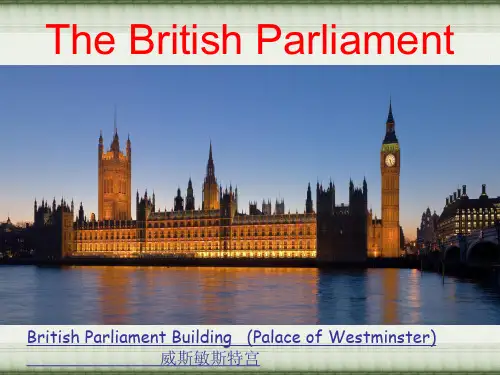
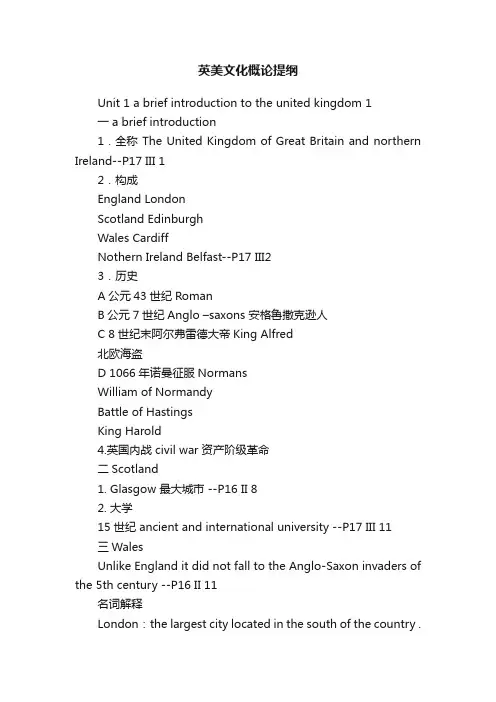
英美文化概论提纲Unit 1 a brief introduction to the united kingdom 1一 a brief introduction1.全称 The United Kingdom of Great Britain and northern Ireland--P17 III 12.构成England LondonScotland EdinburghWales CardiffNothern Ireland Belfast--P17 III23.历史A公元43世纪RomanB公元7世纪Anglo –saxons 安格鲁撒克逊人C 8世纪末阿尔弗雷德大帝King Alfred北欧海盗D 1066年诺曼征服NormansWilliam of NormandyBattle of HastingsKing Harold4.英国内战 civil war 资产阶级革命二Scotland1. Glasgow 最大城市 --P16 II 82. 大学15世纪 ancient and international university --P17 III 11三WalesUnlike England it did not fall to the Anglo-Saxon invaders of the 5th century --P16 II 11名词解释London:the largest city located in the south of the country .London is dominant in the UK in all fields;government finance and culture.London is one of the top three financial centers in the worldUnit 2 a brief introduction to the united kingdom iiNorthern Ireland1.宗教爱尔兰人是天主教徒 Catholics英国人是新教徒 Protestants--P33 I 62.1921年独立 Irish State (分水岭)3.爱尔兰南部26郡成立自由邦北部6 郡仍属英国—P34 II 104 .Loyalist 民族派希望加入爱尔兰共和国Unionist 联合派亲英国5.The official IRA 倾向于政治手段解决–P34 III 4The Provisional IRA 军事–P35 III 5“The Bullet and the Ballot Box”—P35 III 106.区分 Sinn Fein是政党 --P33 I 8/P35 III 11,121919 IRA是军事团体非政党7 .1973年 Power-Sharing mechanism权利分享机制—P34 II 88.1972 “Bloody Sunday”—P34 II 79.1985 Anglo-Irish agreement --P33 I 910. Downing –Street Declaration唐宁街宣言授权英军司令直接干预北爱治安事务名词解释1.”Home-rule”:1914年被签署成为法律。
英美文化概论导言:在全球化的今天,英美文化已成为世界范围内广泛接受和影响深远的文化形式。
英美文化的独特性和多样性使其融入了各个层面的社会生活。
本文将对英美文化进行概述,包括英美文化的起源、主要特征和影响力等方面。
一、起源1. 英美文化的历史背景英美文化源于英国和美国两个国家,两国在历史发展中形成了独特的文化基因。
英国作为美国的殖民地,英国文化是美国文化的重要来源之一。
17世纪至18世纪期间,随着大量移民的涌入,欧洲文化也对美国文化的形成产生了影响。
2. 英美文化的多样性英美文化是一个多元且充满活力的文化体系。
它包括了英国各个地区的本土文化以及美国不同地区和种族背景的文化。
这种多样性使英美文化具备了包容性和创造性。
二、主要特征1. 语言英语是英美文化的基本媒介和表达方式。
英美英语具有许多共同点,但也有一些差异,如发音、词汇和语法等方面。
同时,英语在英美文化中的地位也是相当重要的。
2. 文学英美文学以其独特的风格和世界知名的作家而闻名。
从莎士比亚到丽兹·堤勒,英美文学不仅包括古典作品和传统文学,还涵盖了现代文学和儿童文学等多个领域。
3. 音乐英美文化中的音乐具有广泛的影响力。
从古典音乐到流行音乐,英美的音乐创作和表演都具有独特的风格和特点。
如披头士乐队、迈克尔·杰克逊等,这些音乐人和乐队都成为了英美音乐文化的重要代表。
4. 电影英美电影是全球最具影响力的电影产业之一。
从好莱坞到英国电影,这些电影以其独特的剧情和制作质量广受欢迎。
同时,英美文化对于电影风格、故事情节以及电影产业的发展都起到了重要推动作用。
5. 社交礼仪英美文化中的社交礼仪和行为规范也是其特征之一。
英美人民注重礼节和谦和,在社交场合中会注重礼貌的表达和行为举止。
例如,握手、微笑、道谢等行为是英美社交礼仪中的常见做法。
三、影响力1. 全球影响力由于英美文化的广泛传播和深入影响,其对全球的影响力不言而喻。
无论是英语的普及、英美文学的翻译与传播,还是英美电影和音乐在全球范围内的流行,都体现了英美文化的全球影响力。
美国文化概况Chapter 1 Population, race and ethnic groups第一章人口和种族1) Introduction①American is the third most populous country in the world, with 255.5 million people. It isa nation of immigrants. Immigration accounts for a major source of population growth. There are many racial and ethnic groups. Between 80% and 90% of immigration in the United States now is from Asian and Hispanic counties. The first immigrants in American history came from England and Netherlands. Population movements are common in America.美国是世界上的第三大人口国,总人口约2.555亿,仅次于中国和印度。
美国是一个移民大国,移民人口是其人口总数增长的重要原因。
美国的有着不同民族和种族的人口。
在目前美国移民人口中,80%-90%来自亚洲和西班牙语国家。
美国历史上最早的移民来自于英格兰和荷兰。
人口迁徙在美国十分普遍。
2) Black people and the Civil Rights Movement①blacks and slaveryThe largest of the racial and ethnic minorities in the U.S., which 12.1 per cent of the population; the first blacks were brought to North America as slaves in 1619.美国最大的少数人种是黑人,占人口的12.1%;1619年最早的人人作为奴隶被运至美国。
英美文化概论---------------------------------------《英美文化概论》教学大纲一、教学对象:本大纲的教学对象是全校学生。
只要对跨文化交际感兴趣,喜欢英美文化,想扩充人文知识的同学都可以选修。
二、总学时与学分:本课程总学时为24学时,每周2学时,共十二周, 1.5 学分。
三、教学目的和要求1、教学目的:同英语国家的人们用英语进行有效的交流是学习英语的重要目的之一。
然而有效的交流不仅仅是一个语言技巧问题,还涉及到许多文化因素。
本课程的主旨是希望通过常见的英美文化的介绍,使学习者在跨文化交际中能避免一些不必要的因文化差异而产生的误解,阅读时能更好地理解作者的意图和篇章的内涵,欣赏外国影视作品时有更深的领悟能力。
2、教学要求:本课程是一门以欣赏和领悟为主的课程,对学生不做具体的要求。
针对不同的文化分类,教师采取不同的教学手段和教学方式来引导学生欣赏和理解不同的文化内容。
在物质文化的介绍中,主要通过教师介绍和视频播放,让学生有身临其文化之中的感受。
社会文化和意识文化通过先讲解,再进行案例分析,让学生学会在不同的交际场合,如何处理问题。
四、教学内容及安排五、课程特色本课程通过精心设计的文化案例使学生仿佛身临其境般地感受他国文化,体验真实的跨文化交际感受。
通过图片和视频等视觉工具使学生在轻松愉快的氛围中了解文化差异,拓宽国际视野、提高跨文化交际能力,最终达到教学的目的。
六、考核方式形成性考核:出勤10%+课堂表现10%。
期末考核:对某段视频和案例进行分析,找出其包含的文化现象或寻找其文化失误之处,占80%。
七、参考教材《跨文化交际概论》胡文仲1999.11 外语教学与研究出版社《跨文化交际面面观》胡文仲主编1999.11 外语教学与研究出版社《跨文化非语言交际》毕继万1999.9 外语教学与研究出版社《中英(英语国家)文化习俗比较》杜学增2003.11 外语教学与研究出版社感谢阅读,欢迎大家下载使用!。